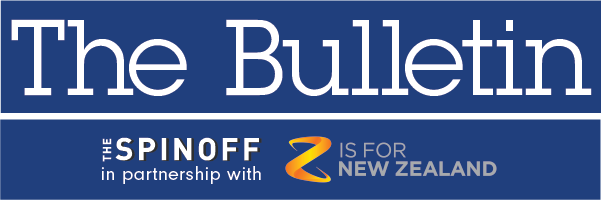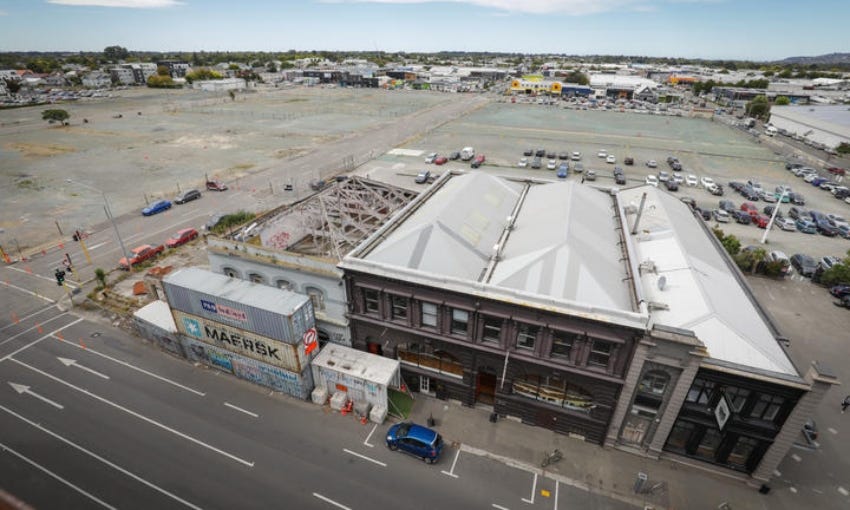Christchurch stadium design downsized amid cost blowout
Does the new stadium still represent value for public money?
Good morning and welcome to The Bulletin for Friday 23 July, by Alex Braae for The Spinoff. Presented in partnership with Z Energy.
In today’s edition: Christchurch stadium design downsized amid cost blowout, FMA gives damning insurance industry assessment, and mental health pilot programme fails to get near targets.
Image: The site where the new Christchurch stadium will go (Radio NZ, Nate McKinnon)
A new design will be needed for the proposed stadium in Christchurch, after cost-overruns caused the original design to be shelved. Steven Walton from The Press has been covering this story closely, with an extraordinary council meeting taking place yesterday, to vote on whether to commission a new design. Originally the stadium was going to be a 30,000-seater, but that was going to go tens of millions over budget, so now it has been cut back to 25,000 – with designers told to look for "efficiencies" to try and bump that up a bit more. There will also be discussions around the regional council and neighbouring district councils putting more money in.
The stadium is billed as multi-use, and maybe it will be, but rugby has loomed large over this whole process. Walton again for Stuff reported yesterday morning that Christchurch will face increased payments to secure major All Blacks tests in the city with a smaller stadium. Christchurch has traditionally been a rugby city, and the reporting included discussion about whether it was sensible to build in capacity that'd realistically only be filled once a year. The NZ Herald reports approval for a smaller design has come from the Crusaders. They simply want to escape their current stadium, which fans largely hate, especially on cold nights. There are also concerns in Christchurch that without a covered stadium, the city will continue to lose out on major event bids to Dunedin, and the Ed Sheeran murals that come with that.
It's not really a rugby story though – it's really a story about infrastructure capacity and commodities. The stadium has become more expensive in large part because the price of steel has boomed – for example, in the US it is currently at record prices which is slowing down other construction projects, and in New Zealand price increases are being seen all throughout construction supply chains. In light of that, the council's decision has been forced somewhat by circumstances outside of their control. But questions should also be asked about the opportunity costs: Resources going towards a stadium at a time of intense housing shortage and a packed infrastructure spending pipeline, the real estate in the city and if it could be used for other purposes, the carbon emissions created by pouring massive volumes of concrete, and whether the stadium still represents value for public money.
For a counter-view to those questions, here's an argument from a member of the Christchurch rugby public. Newstalk ZB's Mike Yardley has laid the blame for the cost overruns on the council, which he said dithered too long amid growing costs. He also accused the council of putting too much focus on transport infrastructure like cycleways, as opposed to the stadium.
The FMA has given a damning assessment of the conduct of the insurance industry in a new report. The story is covered by Katie Bradford at One News, with almost the entire industry displaying conduct "well below" expectations. That includes stuff that hurts consumers, like overcharging and promised discounts not being received – those affected may be due a payout. The Insurance Council said their members are constantly looking to make improvements, but does not believe the report accurately depicts the current state of the industry.
A pilot programme aimed at getting mental health inpatients into housing has barely moved anyone, reports Henry Cooke for Stuff. It was meant to assist about 100 people initially, but eighteen months later just three people have been housed. It was uncovered by questions from National's spokesperson Matt Doocey, who said it was another example of the government's big rhetoric on mental health not being matched with action.
We’re hard at work. But we can’t do this without the support of our members. Support our mission to do more by donating today.
An announcement will be made today on whether the trans-Tasman bubble will stay open. Our live updates had the update as of yesterday afternoon, when a cabinet meeting took place to discuss it. The bubble is closed to Victoria, New South Wales and South Australia already, with questions hanging over Queensland as well. To sum up the Australian situation, New South Wales is still hitting daily updates of above 100 new cases.
The maritime union is defending sailors with Covid, after 43 cases were found in the space of a month. The union's Victor Billot told One News it was wrong to blame the individuals, and New Zealand has an obligation to care for people on the water – but that policy changes might be needed to prevent dangerous situations developing. “A lot of those crews coming in haven’t been vaccinated because they're coming from areas in the world where it hasn’t been rolled out properly yet. It’s actually a major international problem trying to get those crews on vessels or all types of vessels vaccinated,” he said.
The Spinoff has been sent a legal threat by Dr Simon Thornley of Plan B regarding an article on the site by Dr Siouxsie Wiles. Political editor Justin Giovannetti has written up the letter and the context, with Thornley arguing that a reference made to him was defamatory, when considered alongside other statements. The Spinoff has in turn defended the article, and declined to make changes suggested by Thornley.
A correction and apology: Earlier in the week there was a link out to the Substack blog The Terminal, and a reference to the author "Josh Hennessey". I'm embarrassed to say, but his name is actually James, so my apologies for that – Mr Hennessey appears to have taken it in good humour.
If you want to do my job, time is running out. Applications close on Sunday to be Editor of The Bulletin, which has been a very cool and rewarding job for me, and could be for you too!
Got some feedback about The Bulletin, or anything in the news?
Get in touch with me at thebulletin@thespinoff.co.nz
Right now on The Spinoff: Bernard Hickey looks at the ways New Zealand could try and get the vaccine rollout above the plateaus it has hit in other countries. Toby Manhire reports on more Stickybeak polling conducted for The Spinoff – this time about whether the country is on the right track over opening up. Michael Andrew reports on the costs and benefits of the amazing salaries currently being offered amid a tech worker shortage. I spoke to an expert about how that whole "wobbly moon" thing is actually a climate change story. Alexia Santamaria has a really interesting story about an accounting firm whose founders made the decision to be proudly brown in a largely white industry. And Sam Brooks has put his world-class talent for this sort of thing to good use, ranking all the Summer Olympic opening ceremonies.
For a feature today, a change in rhetoric from the American right regarding vaccines. The Atlantic has looked at the pro-vaccine messaging coming out of Fox News in particular this week – when previously the message had been quite a bit less clear. Anti-vax views in the US are heavily concentrated in conservative states. Here's an excerpt:
Carlson, the network’s leading personality, was initially a lonely voice in taking the pandemic seriously, but has since become a merchant of doubt. This editorial tack comes even though owner Rupert Murdoch was quick to get his own shot in December. Fox has also reportedly encouraged, though not mandated, employees to disclose their vaccination status, even as Carlson has likened vaccine passports to Jim Crow laws on air.
Why the shift is happening now, and so abruptly, is not clear. One possible factor is that, as CNN’s Kaitlan Collins reported, “there have been regular, high-level conversations between the White House & Fox News regarding pandemic & vaccine coverage.” Fox quickly denied the report.
Another possibility is the emergence of a new COVID-19 surge, fueled by the Delta variant. Scalise, like some of the others, cited Delta as a reason to get vaccinated now. The more infectious strain has led to rising case numbers in the United States, overloaded hospitals in some states with low vaccination rates, and reinstated lockdowns around the world. Fear about Delta is spreading around the U.S., and it was blamed for a swoon in the stock market yesterday. The Delta variant is also spreading particularly in red states, which lag more liberal areas in vaccine uptake. Yet widespread death and suffering among conservatives and Republican voters has not inspired such a unified response.
Both NZ and Australia have pulled out of playing in the Rugby League World Cup in Britain this year, reports One News. The unions say their concern is the difference in how Covid is managed between the UK and Australia, and player welfare concerns have been top of mind. It's an enormous blow to the tournament, given both teams are theoretical trophy challengers, in a sport with a very small number of elite nations.
And those two football games that were teased a few days ago: The men's team claimed their first ever Olympic win last night, with a gutsy and grim 1-0 win over Asian giants South Korea. Burnley poacher Chris Wood managed to wrangle one in midway through the second half, after a totally dour first half. I take back everything I said about wanting to see nice football, winning is now everything. Unfortunately, the Football Ferns couldn't do the same, going down 2-1 against Australia.
That's it for The Bulletin. If you want to support the work we do at The Spinoff, please check out our membership programme.







